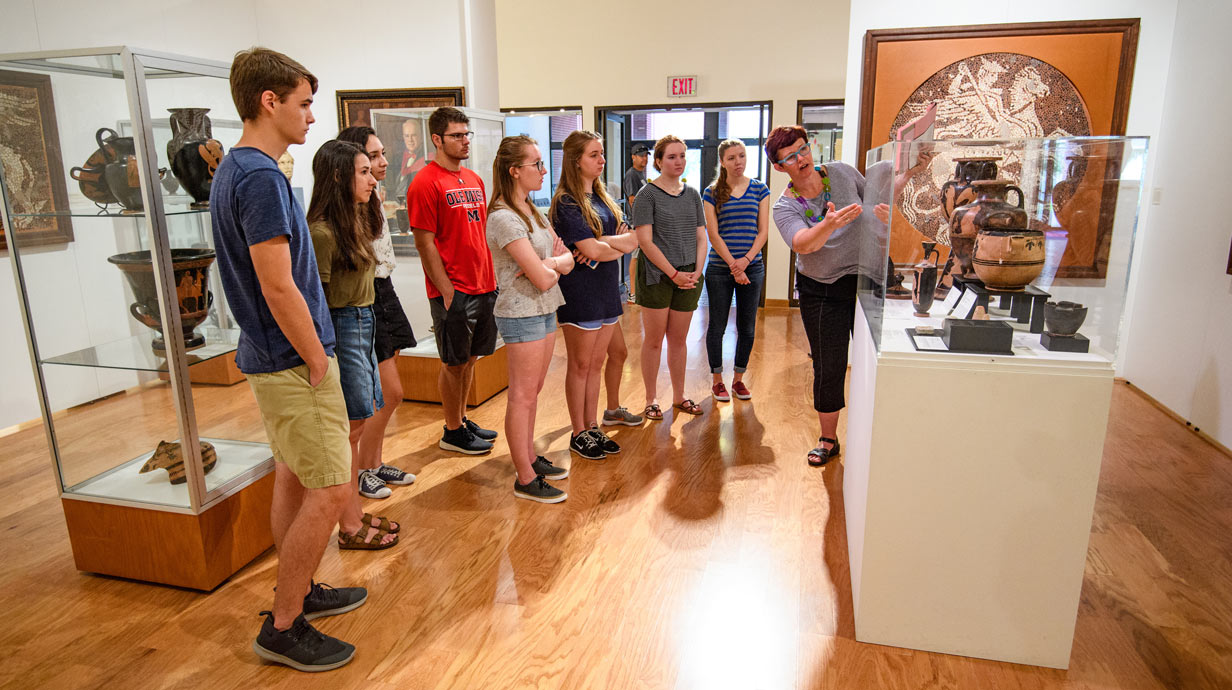Classics, B.A.
Gain historical and cultural awareness in a multicultural world.

“When I started taking Latin at UM, I was welcomed into the Classics department by professors who love to teach and love the subject. Latin 101 rekindled my love for Classics and I just couldn’t let it go.”
Annabelle Harris (B.A. in Classics and English '23)
UM College of Liberal Arts Recruitment Coordinator
Bachelor of Arts in Classics
The Department of Classics in the College of Liberal Arts offers the B.A. in Classics. Classics majors gain a complex view of the ancient Mediterranean world and explore their own world as they do so.
Classics majors
- address questions of human and historical significance through the works of the Greeks and Romans;
- understand the modern cultural world by recognizing its roots in the past;
- know their own language better by learning Greek or Latin;
- explore the world through study abroad; and
- strengthen their ability to read, communicate, observe, and think analytically.
Classics majors at UM work with the 2,000 objects in the David M. Robinson Collection of Greek and Roman Antiquities housed in the University Museum. Students can receive financial support for study abroad - archaeological digs, study tours, or whole semesters abroad. Classics majors may also participate in faculty-led study abroad programs like the Ancient Graffiti Project in Pompeii and Herculaneum or Rome: the Eternal City.
Classics majors choose an emphasis area from the following:
- Classical Civilization,
- Ancient Greek, or
- Ancient Latin.
The Value of a Classics Degree
A classics degree empowers and prepares graduates to deal with complexity and change through a broad knowledge of the world. Classics majors are great candidates for any career field, and have an advantage in gaining admission to medical school, law school, and other graduate programs. They use their skills to explore ancient cultures and languages and then apply that insight to the world around them.
Our classics graduates are prepared to enter into a variety of fields including education, archives, cultural affairs, foreign service, museum curation, government, business, law, media/communications, library science, and more.
On this Page…
Program Information
Degree
B.A. in Classics
Emphases
Classical Civilization ;
Greek ;
Latin
Required Credit Hours
120
Program Type
Major
Minor
Program Location
School
Duration
4 Years
Degree Requirements
Find out about credit hour and course requirements from the 2025-26 academic catalog.
Students in the College of Liberal Arts earning the B.A. degree have a common set of 48-50 hours of general education. The specific courses taken to complete the categories of general education may differ between majors.
Categories of General Education:
- First Year Writing I, II
- English Literature Survey
- Modern or Ancient Language
- History
- Additional Humanities
- Fine or Performing Arts Appreciation
- Mathematics
- Social Sciences
- Natural Sciences
To see the details for these general education requirements, visit the UM online catalog or the degree sheet attached at the top of this webpage.
Students in the B.A. in Classics complete 10 classics courses (30 credit hours), including a required emphasis area, with at least 5 courses (15 credit hours) at the 300-level or higher. A minimum grade of C is required for courses that apply to the major. Students earning the B.A. degree in the College of Liberal Arts complete a minor field of study (or double major).
One course (3 credit hours) of Greek Civilization:
- Clc 101: Intro to Greek Civilization
- Clc 307. Survey of Greek Literature
- Clc 321: Greek Art and Archaeology
- Clc 340: History of Classical Greece
- Clc 341: The World of Alexander the Great
One course (3 credit hours) of Roman Civilization:
- Clc 102: Intro to Roman Civilization
- Clc 308. Survey of Roman Lit
- Clc 322: Roman Art and Archaeology
- Clc 313: The Roman Republic
- Clc 314: Roman Empire
Classics Capstone
- Clc 490: Classics Capstone Seminar
- Clc 491: Classics Capstone Experience
- Honors thesis in Classics
To earn the Classical Civilization Emphasis, students must complete 6 hours of Gr courses at any level or 6 hours of Lat courses at any level. Up to 15 hours in Gr and Lat can count toward the major emphasis in classical civilization. Students must complete 3 hours at the 300 level or higher in each of the department's three classical civilization focus areas: A) Literature, B) History and Culture, and C) Art and Archaeology (see list below). Students must also complete 6 additional hours in one of the three focus areas to make a 9-hour area of concentration.
- Clc 105: From Myth to Film
- Clc 106: Classical Mythology
- Clc 303: Greek and Roman Tragedy
- Clc 304: Greek and Roman Comedy
- Clc 305: Topics in Classical Mythology
- Clc 307: Survey of Greek Literature
- Clc 308: Survey of Roman Literature
- Clc 309: Greek and Roman Epic
- Clc 333: Poetry and Politics at Rome
- Clc 368/AAS 368: African American Lit and the Classics
- Clc 503: Directed Research in Ancient Literature
- One of the following: 300-level or higher Gr or Lat course; Phil 311; Phil 313
B) History and Culture
- Clc 103: Women in Antiquity
- Clc 104: Sports in the Ancient World
- Clc 310: Socrates and Sophistry
- Clc 313: The Roman Republic
- Clc 314: Roman Empire
- Clc 325: Topics in Classical Civilization
- Clc 326: Topics in Classics Abroad
- Clc 327: Greek and Roman Religions
- Clc 329: Slavery in Ancient Greece and Rome
- Clc 331: Science & Tech. in the Ancient World
- Clc 332: Ancient Warfare
- Clc 340: The Golden Age of Athens
- Clc 341: Alexander the Great
- Clc 342: Law and Life in Ancient Athens
- Clc 352: From Republic to Empire
- Clc 502: Directed Research in Ancient History
- Clc 504: Directed Research in Ancient Culture
C) Art and Archaeology
- Clc 107: Ancient Cities
- Clc 315: Egyptian Art and Archaeology
- Clc 316: Bronze Age Aegean Art & Archaeology
- Clc 317: Etruscan Art and Archaeology
- Clc 318: Greek Vase Painting
- Clc 319: Greek Sculpture
- Clc 320: Greek Architecture
- Clc 321: Greek Art and Archaeology
- Clc 322: Roman Art and Archaeology
- Clc 323: Art & Archaeology of Pompeii
- Clc 328: Ancient Art on Location
- Clc 350: Ancient Archaeological Field Session
- Clc 360: Ethics in Archaeology
- Clc 375: Digital Archaeology
- Clc 415: Studying Ancient Artifacts
- Clc 505: Directed Research in Ancient Art and Archaeology
Students must complete 18 hours of Gr courses at the 200 level or higher, with a maximum of 6 credits at the 200 level. They must achieve a grade of C or better in all course work counted for the major in classics with an emphasis in Greek.
Students must complete 18 hours of Lat courses at the 200 level or higher, with a maximum of 6 credits at the 200 level. They must achieve a grade of C or better in all course work counted for the major in classics with an emphasis in Latin.
A minor in classics requires 6 courses (18 credit hours) of Gr, Lat, or Clc, with at least 6 hours at the 300 level or above. Students must achieve a grade of C or better in all course work counted for the minor in classics.
Department Opportunities
Video: Get to Know the Department of Classics
Hear firsthand from students and faculty about the Classics program.

Why Study Classics at UM?
“The professors! My relationships with the faculty changed the course of my life. While a student, I enjoyed the close nature of the department. They knew me on a first name basis, and I appreciated the fondness and accountability that closeness brought with it. My courses were challenging but rewarding, and the professors knew how to push me in encouraging ways. The department helped us found an Archaeological Ethics Debate Team and to travel to competitions, which was the deciding factor for my career choice of Museum Studies.”
Libby Tyson (B.A. in Classics and English '17)
Assistant House Manager, Washington National Cathedral
What Can You Do With a Classics Degree?
- Chief Judge, Mississippi State Court of Appeals
- Principal, Museum Concepts
- Editor, Hyper Nine Media
- Manager, Lincoln Center Theater
- Surgery Physician, University of Mississippi Medical Center
- Web Developer, University of California, Irvine
- Faculty, Brown University
- Foreign Affairs Officer, US Department of State
- Political Consultant, K. Ford & Company
- Chief Operating Officer, Intelligent Robotics
- Associate Editor, Travel Weekly
- Teacher, NW Arkansas Classical Academy
Welcome to the College of Liberal Arts
As Coordinator of Student Recruitment for the College of Liberal Arts, I work with students, and their parents, who are interested in attending UM for their undergraduate degrees. I coordinate personalized visits to our departments, answer questions about the majors and programs in the CLA and handle all recruitment communications from the CLA. Please feel free to send me any questions you may have. It is my job to make sure you have everything you need to make an informed decision on where to spend your college career, and I hope it will be with the College of Liberal Arts at the University of Mississippi!
Annabelle Harris
Admissions Counselor
Future CLA Students

College of Liberal Arts Undergraduate Students
We invite future undergraduates to learn about the College of Liberal Arts, the value of the liberal arts education, our programs, career opportunities, and resources to help you succeed. You can also request a personalized degree sheet.
Next Steps
Explore Affordability
We have a variety of scholarships and financial aid options to help make college more affordable for you and your family.
Apply to the University of Mississippi
Are you ready to take the next step toward building your legacy?
